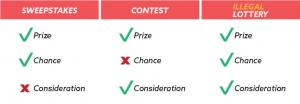 You know about the benefits of running a sweepstakes or contest. But there’s a lot of confusion in the marketing world about federal and state regulations, laws, IRS reporting, social media guides, and all the other requirements needed to run a successful campaign.
You know about the benefits of running a sweepstakes or contest. But there’s a lot of confusion in the marketing world about federal and state regulations, laws, IRS reporting, social media guides, and all the other requirements needed to run a successful campaign.
Because of this confusion, there’s a natural tendency to worry about corporate risk. As a result, marketers (and their bosses/clients) are often concerned about sponsoring sweepstakes or contests.
This article will help you become smarter about running a sweepstakes or contest by pointing out key topics that you’ll need to understand in order to reduce corporate risk.
You will get a basic understanding of the main federal and state laws and regulations. Knowing these basic parameters will help you speak intelligently to your clients (and boss) and to structure a legally compliant promotion campaign.
NOTE: This list is NOT inclusive of all the rules, regulations, and laws regarding promotions.
Let’s dive in, shall we?
1. Am I running a lottery, contest, or sweepstakes?
It’s important to know the differences between lotteries, contests, and sweepstakes. Lotteries are illegal in all U.S. states unless they are sanctioned by a state; examples are lotteries and charitable raffles.

Your promotion would be considered an illegal lottery if all three of these elements are present:
- Prize. This is the bait you use to lure customers in.
- Chance. The odds of someone winning a prize.
- Consideration. Cash payment, purchase, or some states define non-monetary consideration, which is an expended effort to participate in a promotion.
In order to avoid being an illegal lottery, you need to eliminate one of the elements above.
If you remove chance, you have a contest
A contest is a game that involves a degree of skill that will determine the outcome of the promotion. There is usually a panel of qualified judges that score entries based on predetermined criteria.
Examples include:
- Photo contests
- Essay contests
- Recipe contests, etc.
Since you’ve eliminated “chance,” you now have a contest—not an illegal lottery.
If you eliminate consideration (cash payment/purchase), you have a sweepstakes
A sweepstakes is a game of chance. Winners are randomly selected, usually by random draw.
Examples include:
- In-store giveaways
- Online sweepstakes (or giveaway drawings)
- Instant-win sweepstakes
Since you’ve eliminated “consideration,” you now have a sweepstakes—not an illegal lottery. Want more information on prize, chance and consideration?
2. Can I run a sweepstakes that requires a purchase (or “consideration”)?
Do you want to require consumers to purchase something in order to enter? Or maybe you want the consumer to take a lengthy survey? How do you do that?
Wait a second . . .
We just told you that you can’t run a sweepstakes that includes “consideration.” There is a workaround by offering an alternative method of entry (AMOE), sometimes referred to as the “free entry.” An example of an AMOE is a mail-in entry to make the sweepstakes legal.
Here’s what you need to know about an AMOE:
- The AMOE must have equal dignity to the “purchase” method of entry. Meaning, it has to have the same chance of winning.
- Entrants need to be aware of the AMOE. It has to be clearly disclosed on all marketing and promotional materials, usually in the abbreviated and full rules.
3. Do the same laws and regulations apply to all 50 states?
All states fundamentally have the same giveaway laws, except for a handful of states that have additional laws. Here is a list of some of the differences between the states:
- Arizona: Registration is required if the promotion is a contest that requires a purchase or payment in order to participate.
- Colorado:
- Contests/games of skill requiring a purchase or payment to participate are not allowed.
- Direct mail with sweepstakes material is heavily regulated. Full official rules must be included in the mail piece and other required disclosures.
- Florida: For sweepstakes offering a prize pool that exceeds $5,000, the sweepstakes must be bonded and registered seven days prior to the start of the sweepstakes. In addition, you are required to file a winners list and provide it to anyone who requests it.
- Maryland: Contests/games of skill requiring a purchase or payment to participate are not allowed.
- New York: Like Florida, a sweepstakes offering a prize pool that exceeds $5,000 must be registered and bonded prior to the start of the sweepstakes. A winners list must also be posted.
- North Dakota: Contests/games of skill requiring a purchase or payment to participate are not allowed.
- Ohio: If the primary purpose of a store visit is to enter the sweepstakes, the visit is deemed consideration and an AMOE must be provided.
- Rhode Island: Any sweepstakes that takes place or is advertised in a retail establishment and offers a prize pool valued over $500 must be registered prior to the start of the promotion.
- Tennessee: Sweepstakes that require winners to submit to a publicity release are prohibited.
If your sweepstakes involves alcohol or tobacco, there are additional state laws and regulations. Here’s more information for northern states sweepstakes laws and southern states sweepstakes rules and regulations.
4. Do I have to report the prize to the IRS?
The IRS requires a recipient of any prize to report the value of the prize on their income taxes. This includes federal income tax, and some states require state income taxes. If that prize is valued $600 or greater, then the sponsor of the sweepstakes or contest is responsible for issuing an IRS 1099-Misc. income tax form to the winner and the IRS. This can be tricky because you need to obtain the winner’s Social Security number in order to file the form.
We recommend that you always make potential winners aware of the income tax responsibility and require them to formally accept the prize and provide their SSN or a W-9 in order to be declared a winner and before sending a prize.
5. What goes into the official rules?
All sweepstakes and contests must have official rules available to consumers. These rules act as a contract between the sponsor and participants. They can’t be ambiguous, and there are several disclosures that all official rules must include. Here are a few selected elements that go into official rules.
Official rules
- The following statement must be clear and conspicuous in rules: “No purchase necessary.”
- Define timing of the promotion.
- Who is eligible to enter the promotion and where the promotion is void.
- Detailed description of how to enter the promotion and the limits of entry.
- The odds of winning.
- Description of prizes to be awarded and their retail values.
- Description of how winners are determined.
Summary
While this article is NOT inclusive of all the rules, regulations, and laws regarding promotions, it will help you become aware of the areas that you can reduce corporate risk and that you can share with your own legal team and advisory members. To make sure your sweepstakes are legally compliant, you should always work with a sweepstakes management company, commonly called a sweepstakes administrator.
Looking for feedback on your next sweepstakes plan that your boss (or legal team) would feel good about?
Schedule your free sweepstakes (or contest) consultation
Not sure if your idea is legally compliant? Looking for feedback on your next sweepstakes idea?
Whether you’re thinking about running a sweepstakes for the first time or you’re looking to gain the latest marketing insights from our experts, we’ll review your sweepstakes idea to ensure it fits your goal. This assessment is perfect for savvy marketing leaders, digital marketers, agency executives, and corporate attorneys.
Here’s some insight on what you’ll walk away with:
- A free 30-minute consultation on your sweepstakes (or contest) idea
- Recommendations and a plan for how to best execute your idea
- Awareness about which of our services are right for your idea (based on our capabilities and services)
- Help with sweepstakes laws and regulations administration, digital development, hosting, and prize fulfillment
- A timeline that will get your promotion launched as quickly as possible
How do you access your consultation?
Contact us to schedule a time for your free consultation.
What happens after you submit the form?
Just fill out the form so we know a little bit about you and your idea. Then one of our experts will email you to schedule a time for your free, no-obligation consultation. After your consultation, US Sweepstakes & Fulfillment Company will email you a proposal, a sweepstakes plan and a scope of work that your manager and legal team will feel confident in implementing.




